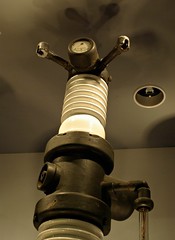Did a little laptop-battery experiment yesterday. My wonderful laptop lasts for a good, long while on battery, I know that. However, I've never found out exactly how long it lasts if I use it for my everyday work. More specifically, can I use it for an entire workday or not, using only the battery?
This matters. Say I get to work and the power adapter is gone or broken. Or I'm on a business trip and forget the adapter at the hotel. Or on a 12-hour flight to Europe. It'd be good to know exactly how much I can get done before the computer dies on me.
So yesterday morning I come to work and did not plug it in. The computer was sleeping during my commute so the battery was nearly but not quite full. To save power I did a few things: I turned down the screen brightness to a low but still comfortable level; turned off the wireless as I don't use it at work; and I put the computer to sleep whenever I was reading something for instance, or when I went to lunch.
This matters. Say I get to work and the power adapter is gone or broken. Or I'm on a business trip and forget the adapter at the hotel. Or on a 12-hour flight to Europe. It'd be good to know exactly how much I can get done before the computer dies on me.
So yesterday morning I come to work and did not plug it in. The computer was sleeping during my commute so the battery was nearly but not quite full. To save power I did a few things: I turned down the screen brightness to a low but still comfortable level; turned off the wireless as I don't use it at work; and I put the computer to sleep whenever I was reading something for instance, or when I went to lunch.
I worked as usual: I'm making a few presentation slides and a list of talking points in Open Office; looked up some papers; read up on a communications library I'm trying to use; and the usual email, websurfing, Octave use, writing a blog post and so on. I did very little coding, and no image editing or anything like that.
I started right after 9 in the morning. When I left for home about 18:20 I had 15% charge left, which should realistically have lasted me about another half an hour to an hour if I needed it (a straight estimate is over an hour, but those last percentages aren't very reliable). Nine hours and a bit, and possibly up to ten hours if I push it.
So yes, I am able to do a whole day of light work without power. I could do a whole day of conferencing or a flight to Europe if I am careful, put it to sleep whenever I break and avoid using the wireless too much. I could not do it if I did mostly software development or image editing; both use the CPU and disk a lot and will drain the battery faster. Battery life is still not good enough — I'd want to be able to confidently leave the power brick at home over the day for that — but it's getting there.


What's your OS, and did you have Smartstep/throttling enabled in your BIOS? Both of those things can have a big effect on battery usage. For example, for the majority of systems, I've read that Windows systems offer much better power conservation than Linux-based OSes
ReplyDeleteThis is Ubuntu 10.10 - Linjux in other words. If by "smartstep" you mean that the cpu clock is lowered during inactivity, then yes, Ubuntu does that when on battery power. No need to set it in BIOS.
ReplyDeleteIt depends on the particular system as always, but I haven't found Linux to be significantly worse than Windows, at least on the machines I've used. 9 hours in practice is just about what I'd expect from any OS on this machine when you compare with the published ideal figures (it's with a year-old battery and with screen brightness still set to a reasonable level, not minimum).
There are more things I could do to tweak it further; increase disk cache holding time and more aggressive screen sleep settings come to mind, but that'd also impact the usability of the machine. For whatever it's worth I'm pretty happy with this result.